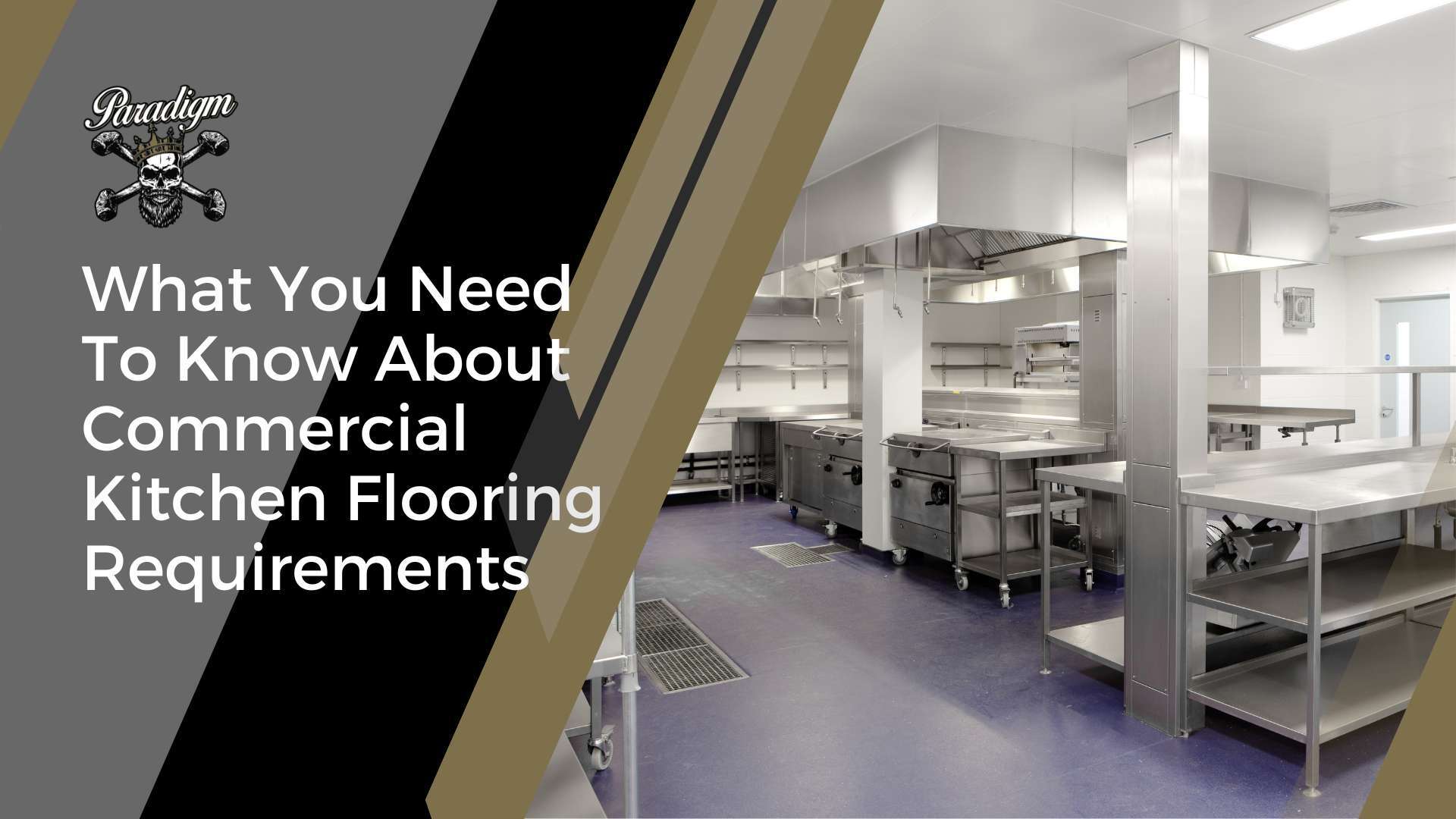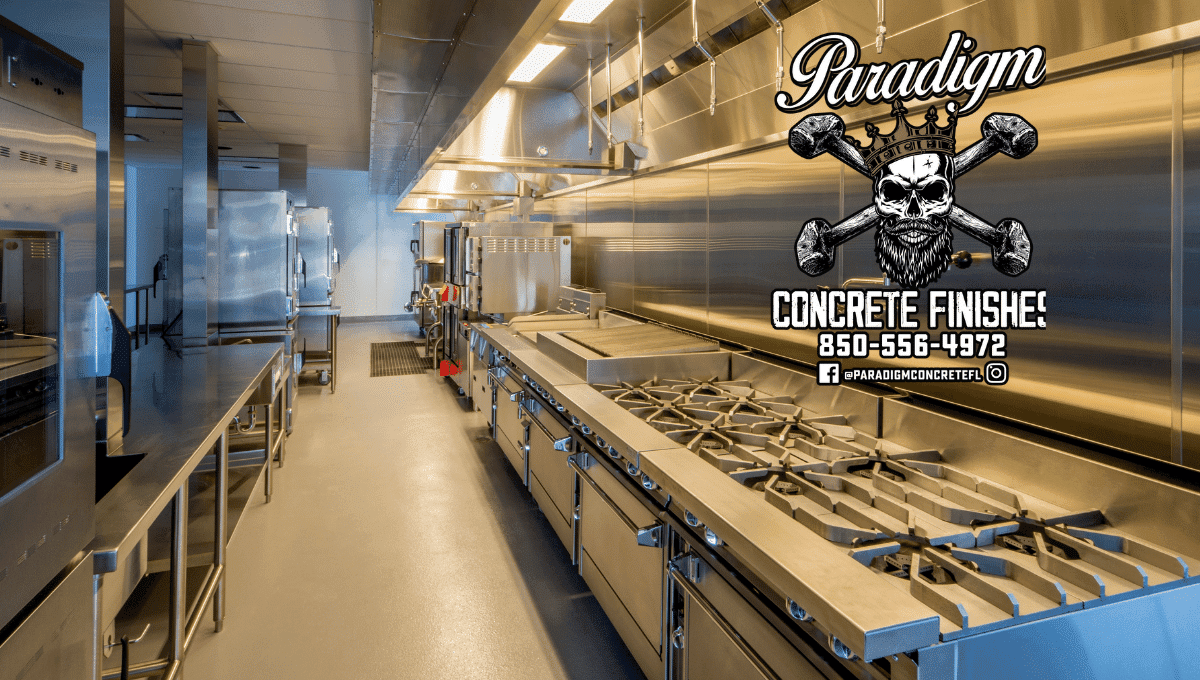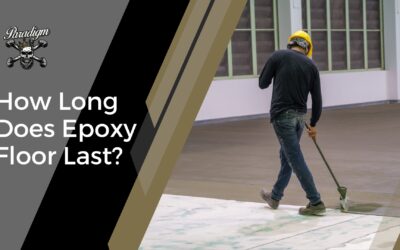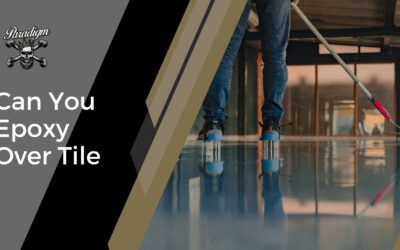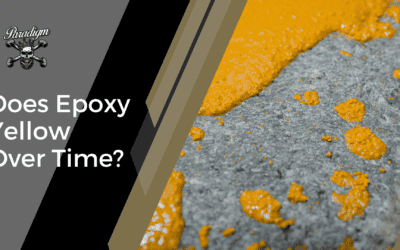Florida has a detailed list of regulations for commercial food establishments. When you hire a contractor or a professional flooring company to help build your commercial kitchen, you’ll need to make sure that your plans meet Florida restaurant guidelines and food establishment minimum construction standards before construction begins.
Only certain materials will be approved, which is another important factor to consider, as materials have an impact on cost and design. Many of the state’s requirements for commercial kitchen floors are common sense and are put in place to ensure everyone’s safety and to keep things as orderly and clean as possible.
Table of Contents
Staying Safe With Slip Resistant Floors
Commercial kitchens must have slip-resistant floors to meet Florida regulations. Kitchens are by nature more prone to liquid spills with the use of cooking oils and sauces, as well as water for washing dishes, produce, and other food items. These spills are a safety hazard, so installing a slip-resistant floor will go a long way in preventing injuries.
Although some slip-resistant floors aren’t as easy to clean as their smoother counterparts, it is possible to install a floor with the right balance of traction and smoothness, as there are a variety of customizable flooring materials available on the market.
Focus On Hygiene
Commercial kitchen floors in Florida must be smooth and easy to clean, with hygiene being another primary concern. Not only must your commercial kitchen meet the requirements of the Florida health inspection list, but looking after the well-being of your employees and customers should also be of the utmost importance.
Floors with seams and grouting are much harder to clean and attract food particles and microbes which can be difficult to get rid of completely. A seamless, smooth floor, on the other hand, leaves no room for bacteria to hide and grow. Paired with a mandatory built-in floor drain, a properly sloped floor is easy to clean, with all spills flowing toward the drain to prevent mold, mildew, and unsanitary standing water.
Best Commercial Kitchen Floors
Commercial kitchen floors need to be durable and able to withstand high foot traffic and heavy loads and epoxy coatings are well regarded as the best option. Commercial kitchen floors also need to be chemical resistant, as they will often be exposed to strong detergents and degreasing agents to keep things clean. You’ll want to choose a floor that is strong enough to withstand abrasion from dropping equipment such as knives and cooking utensils, as well as food items such as sugar and spices which can wear down surfaces over time.
Epoxy Floors
Epoxy floors are durable, antimicrobial, and can withstand high foot traffic as well as chemical and grease spills. For this reason, they are the number one choice for commercial kitchen floors.
Quartz Floors
Quartz is an additive to epoxy floors that are broadcast on top of the epoxy coating to provide extra durability as well as slip resistance, making this combination of epoxy and quartz the gold standard for commercial kitchens.
Polyaspartic Top Coat
Polyaspartic top coating is an extra layer that can be added on top of the quartz to make sure the floor is doubly sealed and non-porous so that bacteria can not live on or in it.
Ceramic Tile
Ceramic tile used to be the most widely used solution for commercial kitchens, however, it has become outdated since grease and bacteria can build up within the grout and it can also become slippery.
Vinyl Flooring
Vinyl flooring can be a good surface but typically it can not stand up to the pressure a commercial kitchen puts on it.
Tolerant To Heat And Humidity
Another important factor to consider is the heat tolerance of the flooring you choose. Commercial kitchens are exposed to high temperatures with the use of dishwashers, deep fryers, and cooking ranges, as well as the use of steam cleaning and cleaning with hot water. A floor that is resistant to heat and humidity that can also adjust to fluctuations in temperature is ideal, as there will likely be exposure to colder temperatures with the use of walk-in fridges and freezers.
Not only does a floor need to be able to tolerate humidity generated by the day-to-day activities of a busy kitchen, but to environmental humidity from the concrete and soil beneath the floor as well. A professional flooring service will be able to test the concrete for any moisture issues and install the floor properly to avoid air bubbles or other issues that could cause damage.
How We Can Help You
When you are planning a commercial kitchen, the number of decisions that need to be made can be overwhelming. Whether you are building a kitchen for a hotel, restaurant, or other commercial space, your building plans and material selections need to be up to state standards.
At Paradigm, we have years of experience installing commercial kitchen floors in compliance with Florida food safety regulations and can help save you time, money, and energy. If you are looking for a professional flooring company with commercial expertise, contact us today. We provide commercial floors in all of the following areas:
Directions To Paradigm Concrete Finishes
We service the main areas of Florida and have successfully completed hundreds of commercial kitchen epoxy floors. If you have any questions, please reach out to us.
Sources:
https://www.fdacs.gov/content/download/64038/file/Food_Establishment_Minimum_Construction_Standards.pd

